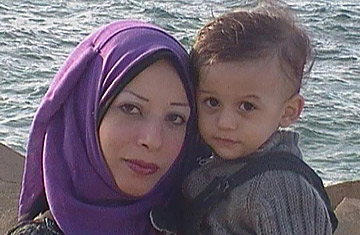
In this undated family photo, Mona Ghorayib, left, poses with her son in Alexandria, Egypt. Ghorayib, wife of an exiled Syrian dissident, said Syrian men kidnapped and held her captive for 30 hours in November
On Friday, Nov. 25, Mona Ghorayib woke up on a metal bed in a tiny room that she didn't recognize. Someone had boarded up the only window, and a fan was switched on at full blast despite the fact that it was cold outside. Ghorayib tried to sit up, but she felt dizzy and couldn't see straight.
The last thing she remembered doing was walking into the lobby of her parents' apartment building in downtown Cairo and hearing her phone ring from her purse. "I opened my purse to take out the phone, and I could feel someone coming up behind me on the right," she says. "I moved to the left to let him pass, but I felt someone else on my left." Her attackers sprayed a chemical in her face and she lost consciousness.
Ghorayib had no idea where she was taken. The only sound outside was the rhythmic croaking of frogs, suggesting that she was no longer in the noisy Egyptian capital. But when she heard the Syrian accents in the hallway, she knew exactly why she was there. "The only thing I could hear was one asking the other: 'Is she Thaer's wife?' And the other said, 'Yes.'"
Ghorayib's husband, Thaer al-Nashef, is a prominent Syrian journalist and dissident — and one of the Syrian regime's most vocal critics in exile. Ever since he fled Damascus in 2005, al-Nashef and his family have dealt with threats and harassment via phone and e-mail — including a few recent messages that warned Ghorayib that her husband was a spy and adulterer. But after the Syrian uprising began in March, and al-Nashef began documenting the ongoing massacres and abuses, the harassment took a turn for the worse. "They started to threaten me, saying they would kidnap my wife and kill her, and then kill me. And the messages got much more frequent," al-Nashef says. "Before the revolution, their messages were always in reaction to my articles. Since the revolution, it's become completely random."
Navi Pillay , the U.N. High Commissioner for Human Rights, said Monday that more than 5,000 people have been killed so far amid Syria's worsening violence. Meanwhile tens of thousands of refugees and activists have fled the country. The ones with connections and money head to Europe or North America; many more have arrived by the thousands at refugee camps in Lebanon and Turkey. Others have ended up in Egypt, Jordan and Libya. But just as the regime of President Bashir Assad has stepped up its crackdown on opponents at home, so too does it appear to be escalating its campaign against critics abroad, particularly in nearby countries.
On Sunday night, Syrian activist Rami Jarrah was detained by the Qatari authorities when he landed at Doha International Airport. "Im not told why, im just told that im not allowed entry," Jarrah tweeted under his pseudonym, Alexander Page. "i said ok ill go back, he said 'you are #Syria'n then thats where you go.'" Jarrah, who was arrested and tortured for his participation in antigovernment protests before fleeing Syria, believes that had he been deported he most certainly would have been killed. (The Qataris ultimately allowed him to enter the country.) A week before he was detained, Jarrah told TIME that several men with Syrian accents had chased him through the streets of downtown Cairo several days earlier. A week before that, the shopkeeper below his building reported that Syrian men had come looking for him, asking what apartment he lived in and if he was at home. "No Syrians would know where I live," says Jarrah, who is certain that his visitors were sent by the Syrian government. For two months, he has been receiving threatening phone calls. "They're mainly at six in the morning," he says. "That seems to be some sort of strategy, cause that's when they can really scare you. We wake up to these phone calls saying 'Assad owns you. Assad is the king.' Stuff like that. It's always a Syrian voice."
Another recent escapee, Tareq Sharabi, was talking on his cell phone in the lobby of a Cairo hotel last week when two large men grabbed him from behind and dragged him across the floor. Sharabi instantly flashed back to the protests in Damascus where he had seen friends and colleagues drop like flies, shot down by government death squads popularly known as shibih — literally, ghosts. The men were muscled, with cropped hair, he says. "It was the same guys we used to see in the demonstrations in Syria. And when he grabbed me and said, 'Are you with us or not?' I felt like I was right back in Syria." Sharabi's friend, another Syrian, quickly pulled him back and the two ran out of the hotel. The men chased them for several blocks before giving up.
